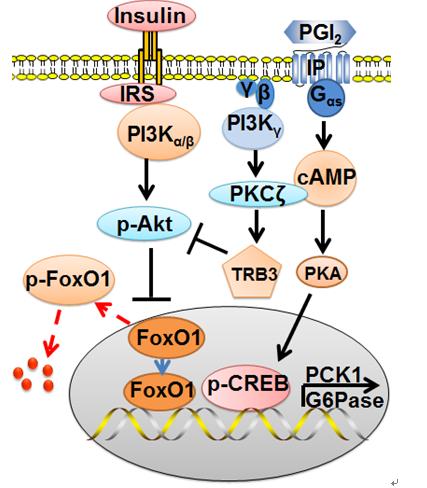
Researchers Reveal Novel Function of Iprostanoid Receptor in Regulation of Hepatic Gluconeogenesis
Apr 25, 2014 Email"> PrintText Size

A team of researchers led by Professor YU Ying, at the Institute for Nutritional Sciences (INS), Shanghai Institutes for Biological Sciences found that Iprostanoid receptor-mediated inflammatory pathway promoted hepatic gluconeogenesis in mice through activation of PKA and inhibition of AKT.
In recent years, there has been an increase in the global prevalence of diabetes, and several observations indicate that gluconeogenesis is increased in type 2 diabetes. Elevated PGs have been observed in both type 1 and type 2 diabetes mellitus. Epidemiological studies have indicated that the use of non-selective NSAIDs, including ASA, is associated with a significant reduction in the risk of diabetes in healthy populations. Selective COX-2 inhibitors have also been reported to increase insulin sensitivity in healthy individuals, and to ameliorate diabetes in experimental animals. These observations raise the possibility that PGs play a role in carbohydrate metabolism, especially in hepatic gluconeogenesis, the predominant source of increased hepatic glucose in type 2 diabetes mellitus. However, the potential importance of PGI2 in regulating glucose metabolism in liver is unknown.
In this study, Dr. YU and his colleagues found the upregulation of the COX-2/PGI2/IP axis in the livers of fasted, or high-fat diet (HFD)-treated mice, or mice in which diabetes had been induced genetically or pharmacologically. Deletion of the PGI2 receptor IP conferred protection against diabetes in mice due to the suppression of hepatic gluconeogenesis. Conversely, re-expression of IP in liver, augmented hepatic glucose output and led to insulin resistance by enhancing intracellular adenylatecyclase activity and upregulating TRB3-dependent AKT phosphorylation, and subsequently promoting transcription of the key hepatic gluconeogenic enzymes PCK1 and G6Pase. These data suggest that PGI2 is involved in modulation of hepatic gluconeogenesis through the IP.
This work entitled “Iprostanoid receptor-mediated inflammatory pathway promotes hepatic gluconeogenesis through activation of PKA and inhibition of AKT” was published online before print in the Diabetes on 10 April, 2014.
This work was supported by research grants from the National Natural Science Foundation of China, the Ministry of Science and Technology of China, and the Chinese Academy of Sciences.
Contact:
YU Ying, MD& Ph.D.
Principal Investigator Institute for Nutritional Sciences, Shanghai Institutes for Biological Sciences, Chinese Academy of Sciences,
Shanghai 200031, China.
Tel: 86-21-54920970;
Fax: 86-21-54920270;
E-mail: yuying@sibs.ac.cn

IP modulates hepatic gluconeogenesis through both PI3Kg/PKCz/TRB3/AKT and cAMP/CREB pathways. (Image by Dr. YU Ying’s Group)
A team of researchers led by Professor YU Ying, at the Institute for Nutritional Sciences (INS), Shanghai Institutes for Biological Sciences found that Iprostanoid receptor-mediated inflammatory pathway promoted hepatic gluconeogenesis in mice through activation of PKA and inhibition of AKT.
In recent years, there has been an increase in the global prevalence of diabetes, and several observations indicate that gluconeogenesis is increased in type 2 diabetes. Elevated PGs have been observed in both type 1 and type 2 diabetes mellitus. Epidemiological studies have indicated that the use of non-selective NSAIDs, including ASA, is associated with a significant reduction in the risk of diabetes in healthy populations. Selective COX-2 inhibitors have also been reported to increase insulin sensitivity in healthy individuals, and to ameliorate diabetes in experimental animals. These observations raise the possibility that PGs play a role in carbohydrate metabolism, especially in hepatic gluconeogenesis, the predominant source of increased hepatic glucose in type 2 diabetes mellitus. However, the potential importance of PGI2 in regulating glucose metabolism in liver is unknown.
In this study, Dr. YU and his colleagues found the upregulation of the COX-2/PGI2/IP axis in the livers of fasted, or high-fat diet (HFD)-treated mice, or mice in which diabetes had been induced genetically or pharmacologically. Deletion of the PGI2 receptor IP conferred protection against diabetes in mice due to the suppression of hepatic gluconeogenesis. Conversely, re-expression of IP in liver, augmented hepatic glucose output and led to insulin resistance by enhancing intracellular adenylatecyclase activity and upregulating TRB3-dependent AKT phosphorylation, and subsequently promoting transcription of the key hepatic gluconeogenic enzymes PCK1 and G6Pase. These data suggest that PGI2 is involved in modulation of hepatic gluconeogenesis through the IP.
This work entitled “Iprostanoid receptor-mediated inflammatory pathway promotes hepatic gluconeogenesis through activation of PKA and inhibition of AKT” was published online before print in the Diabetes on 10 April, 2014.
This work was supported by research grants from the National Natural Science Foundation of China, the Ministry of Science and Technology of China, and the Chinese Academy of Sciences.
Contact:
YU Ying, MD& Ph.D.
Principal Investigator Institute for Nutritional Sciences, Shanghai Institutes for Biological Sciences, Chinese Academy of Sciences,
Shanghai 200031, China.
Tel: 86-21-54920970;
Fax: 86-21-54920270;
E-mail: yuying@sibs.ac.cn

IP modulates hepatic gluconeogenesis through both PI3Kg/PKCz/TRB3/AKT and cAMP/CREB pathways. (Image by Dr. YU Ying’s Group)
CAS Institutes
There are 124 Institutions directly under the CAS by the end of 2012, with 104 research institutes, five universities & supporting organizations, 12 management organizations that consist of the headquarters and branches, and three other units. Moreover, there are 25 legal entities affiliated and 22 CAS invested holding enterprisesThere are 124 I...>> more
Contact Us

Chinese Academy of Sciences
Add: 52 Sanlihe Rd., Xicheng District, Beijing, China
Postcode: 100864
Tel: 86-10-68597592 (day) 86-10-68597289 (night)
Fax: 86-10-68511095 (day) 86-10-68512458 (night)
E-mail: cas_en@cas.cn

